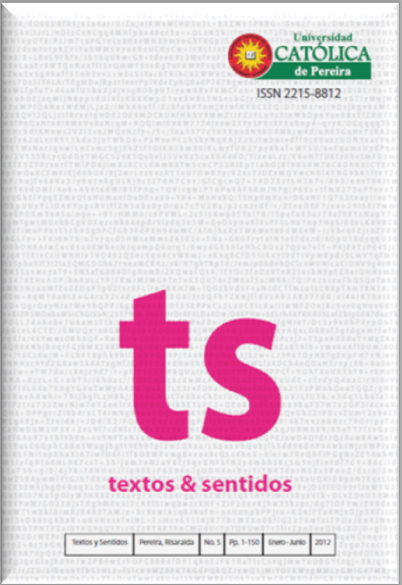Cognitive Dissabilities, a look from teachers´ conceptions
Keywords:
conceptions, cognitive dissabilities, inclusion, segregation and integrationAbstract
This paper is the result of the analysis of various interviews and observations with three teachers from the Institución Educativa San Vicente Hogar from fi rst and second grades. We focused on the teachers’ believes about educational possibilities of girls with cognitive dissabilities, considering that in their classroom there are already girls who show signs of such dissabilities. It was through that approach, and the use of hermeneutic translations, that we came up with a description of its conception and the way these are related to their practices. These are evident in the teachers’ daily duties and in the way the teachers relate to the girls with cognitive dissabilities. As a result of this process we were able to grasp and understand the conceptions of teachers on the subject at hand, which is such a fundamental part of understanding the changes, both required and feasible, in the fi eld, cultures and politics, in order for its inclusion to become a reality within the context of education.
References
Arnaiz, P. (2003). Inclusión educativa una escuela para todos. Málaga: Algibe.
Arnaiz, P. (1996). Las escuelas son para todos. Revista siglo cero, 27. Recuperado de http://www.congreso.gob.pe/comisiones/2006/discapacidad/tematico/ educacion/ Las-Escuelas-para-todos.htm
Blanco, R. (2006). La equidad y la inclusión social: uno de los desafíos de la educación y la escuela hoy. Revista Electrónica Iberoamericana sobre Calidad, Efi cacia y Cambio en Educación, 4(3). Recuperado de http://www.rinace.net/arts/ vol4num3/art1.htm Blanco, R. (2011). De la inclusión en la escuela a la inclusión en el aprendizaje. Palabra Maestra número 28. Recuperado de http://www. palabramaestra.org/admin/docs/1316710774PALABRA_MAESTR A%2028-%20 fi nal%20septiembre%206%20(1).pdf
Unesco (2007). Taller Regional Preparatorio sobre Educación Inclusiva América Latina, Regiones Andina y Cono Sur, Buenos Aires, Argentina. La difi cultad para concretar las normas en inclusión educativa. Recuperado de http://www.ibe. unesco.org/fileadmin/user_upload/Inclusive_Education/Reports/ buen osaires_07/ colombia_inclusion_07
Marchesi, A. Coll, C. y Palacios, J. (1990). Desarrollo psicológico y educación. Trastorno del desarrollo y necesidades educativas especiales. (Tomo 3). Madrid: Alianza
MEN, (2006). Orientaciones Pedagógicas para la Atención Educativa a Estudiantes con Discapacidad Cognitiva. Bogotá: Autor. Prudhommeau, M. (1976). Infancia anormal. Barcelona: Planeta.
Rodrigo, M., Rodríguez, A. y Marrero, J. (1993). Las teorías implícitas. Madrid: Visor.

